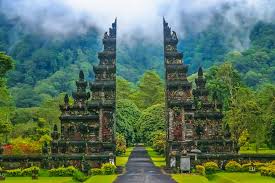Travel Guide to Bali’s Culture, Nature & Adventure, it’s All About Bali
Bali, known as the “Island of the Gods,” is famous for its breathtaking landscapes, rich culture, and warm-hearted people. Beyond its beautiful beaches and temples, Bali is home to a unique and deeply spiritual society. This article explores the population, cultural traditions, and characteristics of the Balinese people, giving you a deeper understanding of this enchanting island and All About Bali.

Population of Bali
Bali is one of Indonesia’s most visited tourist destinations, yet it maintains a distinct cultural identity. According to the latest estimates, Bali has a population of around 4.3 million people, with most residents living in the southern and central regions.
Demographics
- Ethnic Composition: The majority of the population consists of ethnic Balinese, but there are also Javanese, Chinese, and expatriate communities.
- Religious Beliefs: Over 85% of Balinese people practice Hinduism, which differs from Indian Hinduism due to strong influences from animism and Buddhism.
- Urban and Rural Divide: While areas like Denpasar, Kuta, and Seminyak are urbanized, much of the population still lives in traditional villages.
Balinese Culture
All About Bali’s culture is deeply rooted in Hindu traditions, and it is evident in daily life, religious ceremonies, and artistic expressions.
Religious Influence
Bali is often described as the “Island of a Thousand Temples” because of its numerous sacred sites. Hinduism shapes many aspects of Balinese life, from birth to death, with rituals and ceremonies held regularly.
- Temple Ceremonies: Each village has at least three temples dedicated to different aspects of life.
- Daily Offerings: Balinese people make daily offerings (Canang Sari) to express gratitude and seek protection from spirits.
- Nyepi (Day of Silence): This is the Balinese Hindu New Year, where the entire island shuts down for a day of silence and self-reflection.
Arts and Traditions
Balinese culture is rich in dance, music, and craftsmanship.
- Traditional Dances: The Kecak dance, Barong dance, and Legong dance are performances that tell stories of good versus evil.
- Gamelan Music: A unique Balinese orchestra using metal percussion instruments.
- Handicrafts: Bali is known for wood carvings, batik textiles, and silver jewelry, which are all integral to its heritage.
Characteristics of Balinese People
Balinese people are known for their hospitality, spirituality, and strong community values. Tourists often describe them as welcoming and deeply connected to their traditions.
1. Strong Community Bonds (Gotong Royong)
- Balinese society follows the principle of gotong royong, meaning mutual cooperation.
- People work together for temple ceremonies, village events, and even everyday tasks.
2. Friendly and Welcoming Nature
- The Balinese are famous for their warm smiles and hospitality.
- They are accustomed to interacting with tourists and often go out of their way to help visitors.
3. Deeply Spiritual
- Religion plays a vital role in daily life, influencing social structures, work schedules, and even economic activities.
- Many Balinese people start their day with prayers and offerings to the gods.
4. Respect for Tradition and Hierarchy
- Balinese society follows a caste system, though it is more relaxed than in India.
- Respect for elders, community leaders, and spiritual guides is highly valued.
Balinese Lifestyle and Daily Life
Rural vs. Urban Living
- Village Life: Many Balinese live in banjars (traditional communities), where daily life revolves around farming, rituals, and community events.
- City Life: In urban centers like Denpasar and Kuta, modern lifestyles mix with traditional customs.
Occupation and Economy
- Tourism is the backbone of Bali’s economy, employing many locals in hotels, restaurants, and tour services.
- Agriculture remains important, with rice farming being a significant livelihood.
- Handicrafts and arts provide income for many Balinese families.
All About Bali’s charm lies not only in its landscapes but also in its people and culture. Understanding their way of life enhances your appreciation of the island. Whether you’re visiting for tourism or cultural exploration, Bali offers an unforgettable experience filled with warmth and tradition.
Let us know what you need All About Bali, or contact us here!

